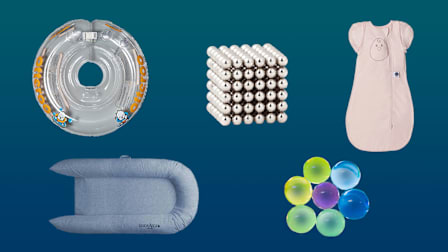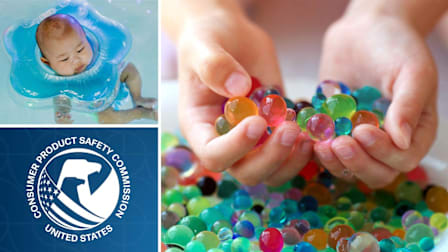Federal Lawmakers Call for National Ban on Water Beads
The beads, sold as toys, have been linked to deaths and thousands of ER visits

Update: On May 9, 2024, Sens. Tammy Baldwin, D-Wis., Bob Casey, D-Pa., and Susan Collins, R-Maine, introduced a bill in the Senate that would also ban water beads. They named it Esther’s Law, after the 10-month-old baby who died after ingesting a water bead in 2023.
Standing in front of the Jersey Shore University Medical Center in Neptune, N.J., on Monday morning, Rep. Frank Pallone Jr., D-N.J., called for a national ban on water beads marketed to children. Pallone said that the Ban Water Beads Act, which he planned to introduce in the House later in the week, would make it illegal to sell these water-absorbing, expandable beads as toys.
“They look and sound fun, but the reality is these colorful products can become deadly or cause serious injuries when swallowed by children,” Pallone said.
Pallone was joined in support for the bill by Alexander Hoehn-Saric, chair of the Consumer Product Safety Commission, as well as parent advocates and Consumer Reports safety experts.
The announcement comes just weeks after Consumer Reports’ investigation of water beads and the hazards they can pose to children, especially to toddlers and babies. Individual water beads can start out tiny but expand dramatically in water, and can grow to a dangerous, life-threatening size inside children’s bodies if they are swallowed, put in ears or noses, or inhaled. The beads look like candy and are incredibly easy to lose track of in the home, even with close parent supervision.

Photo: Lauren Kirchner/Consumer Reports Photo: Lauren Kirchner/Consumer Reports
The parents took turns sharing their families’ stories, and all expressed their support of the Ban Water Beads Act.
Taylor Bethard spoke last, describing her and her family’s grief in the months since Esther’s death, which she calls an “unimaginable” nightmare. She said that the Ban Water Beads Act would help ensure that other families would not have to experience the same thing.
Instead of holding her daughter Esther, she’s now “fighting to give her a voice,” Bethard said. “A voice that shouts, “Our children deserve better. Families deserve better.’ Thank you for hearing Esther’s voice today.”
Pallone gave Bethard a small hug after her remarks.
Pallone isn’t the only member of Congress taking notice of this toy’s hazards. In late September, Sen. Richard Blumenthal, D-Conn., wrote a letter to CPSC Chair Hoehn-Saric “with serious concerns over reports of young children being hospitalized” by water beads that had been marketed as toys.
Blumenthal urged the CPSC to take steps to remove water beads from the market. The letter also requested more information from the agency—including questions like how many injury incidents it was aware of, what the agency was planning on doing to educate parents about the risks of water beads, and what other actions it was considering on this issue. “Does the CPSC need additional authorities to ban the use of water-absorbing beads as toys?” Blumenthal asked.
The CPSC has not yet responded to Blumenthal’s letter as of this writing, according to the senator’s staff. And CPSC Commissioner Rich Trumka Jr. criticized his own agency’s too-weak position on water beads last week, citing it as one reason he was voting against the operating plan for the upcoming year. But CPSC Chair Alexander Hoehn-Saric was at Pallone’s side for the press conference, describing how a congressional bill can help cut through the procedural rules and red tape that would otherwise be an obstacle to the agency passing new regulations on its own.
“That’s why the bill that Congressman Pallone is introducing is so important, because that is the fastest way to move forward and take care of this problem across the country for all parents,” said Hoehn-Saric. “A direct mandate from Congress can be implemented quickly.”
William Wallace, associate director of safety policy at Consumer Reports, also spoke at the press conference. “Consumers and parents nationwide expect that if a product is on store shelves and it’s available for sale online, that it is safe,” said Wallace, “and that simply cannot be the case with water beads.”
Following the publication of CR’s water bead investigation in September, the organization’s safety advocates launched a petition pressing the CPSC to take action against these toys. This week, they plan to deliver to the agency the signatures of nearly 100,000 people who signed that petition and a petition started by Ashley Haugen.
In the meantime, CR has offered the following recommendations to consumers as they strive to keep their families safe:
• Avoid having water beads in the home if children or cognitively impaired adults are ever-present.
• Use room-temperature, digestible food, such as rice, beans, pasta, or peas, for sensory play.
• If water beads are already in the home and are subject to an open recall, put them in a tightly sealed container, in a secure location out of sight and out of reach, until you have returned them or otherwise completed the recall instructions.
• If water beads are in the home and are not subject to an open recall, throw them away immediately.
Editor’s Note: This article, originally published Nov. 13, 2023, was updated Nov. 21, 2023, to reflect newly available data from the CPSC about emergency room visits related to water bead injuries. It was updated again May 9, 2024, to include information about a bill introduced in the Senate that would ban water beads.




















